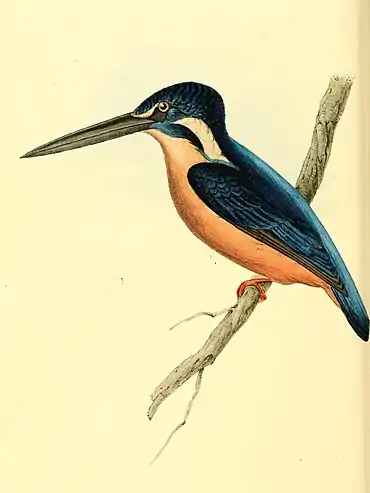
ALCEDO Asiatica.
Asiatic Kingsfisher.
Generic Character.—See Pl. 26.
Specific Character.
- A. capite nigro, fasciis transversis cyaneis, posticè cristato; auribus cyaneis; mento, gulâ, strigâque laterali colli albescentibus; dorso nitidè cæruleo; corpore subtùs rufo.
- Head black, transversely banded with mazarine blue, the hinder part crested; ears blueish; chin, throat, and lateral stripe on each side the neck whitish; back shining light-blue; body beneath rufous.
- Obs. This bird Dr. Horsfield tells me is his Alcedo meninting described in the Linn. Transactions.
The general resemblance between this and the European Kingsfisher may have been the cause why it has remained hitherto unnoticed by ornithologists. It bears, however, on closer inspection, a strong and peculiar distinction in the crest at the back of the head, in being much smaller in size, and especially as inhabiting the hottest parts of India; while our own braves the cold of a Siberian winter.
Total length six inches, of which the bill from the angle of the mouth to the tip occupies one inch and three-quarters, and is black, with the under mandible paler; the ears and the upper part of the head and neck are blueish-black, transversely banded with somewhat crescent-shaped narrow bands of a rich deep blue, which are broken into spots on the crest and ears: from the base of the under mandible is a black stripe richly glossed with blue, and carried down on each side the neck, between which and the upper part is a whitish stripe beginning just behind the ears (this in the European species is rufous). The wing-covers, scapulars and lesser quills are blackish glossed with blue, the two former having a bright spot at the end of each feather; superior and greater quills entirely blackish; down the middle of the back, rump, and tail-covers, light and vivid blue, with a slight tinge of greenish; chin and throat cream-colour; line between the nostrils and eyes, margin of the shoulders, under wing-covers, and all the lower parts of the body, rufous; tail deep and obscure blue; legs red.
My specimen came from some part of India; I have met with others from the same place; and Dr. Horsfield has likewise observed it in Java.